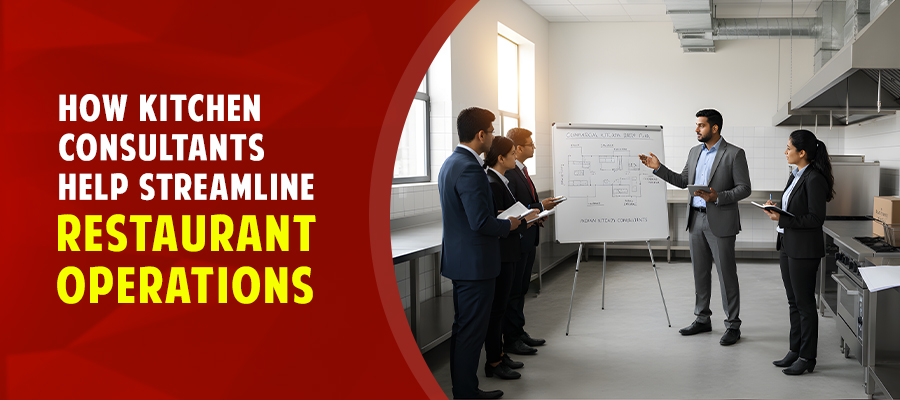
How Kitchen Consultants Help Streamline Restaurant Operations
Nov 15, 2025Walk into any successful restaurant, and the first thing you'll notice is the dining area: the ambiance, the service, the presentation. But the kitchen? That's where success is actually made or broken. A poorly planned commercial kitchen can sink even the best restaurant concept. A well-designed one? It runs like a well-oiled machine.
Most restaurant owners figure this out too late. Your kitchen layout has a direct impact on profitability, and this is where kitchen consultants make their real value clear.
When Poor Design Costs You Money
Walk into a kitchen that's in disarray, and the reasons become rather clear. Cooks are sprinting back and forth between stations; the prep area is way too far from the cooking line; vessels build up at the dishwashing section as there is no proper flow; the exhaust system can barely handle the heat, and by 8 PM, the whole kitchen is nothing less than a furnace.
This isn't just about comfort. Inefficient layouts can cut productivity as much as 30%. Orders take longer, staff get exhausted, and customers leave unhappy. Probably won't come back either.
Good kitchen consultants identify these issues before the construction even starts. They understand workflow patterns, know where bottlenecks will appear during rush hours, and can tell which equipment will actually work for your operation versus what looks good on paper. Sabari Kitchen has been doing this across Tamil Nadu for over 30 years-they have seen every mistake possible and know how to avoid them.
Getting the Flow Right
Commercial kitchens require a lot of planning. Consultants plan the entire workflow, from receiving ingredients to plating. Where is the vegetable preparation done? How far is the refrigeration from the cooking stations? Can the head chef oversee the whole operation without moving much?
Think of it this way: if you do 200 meals in an evening and the cooks each take three unnecessary steps per dish, you've wasted 600 steps. A good consultant redesigns the layout
so everything flows. The fridge is closer to prep. The plating area is placed so communication happens smoothly. Those little things add up: You serve more customers with the same team, without anyone working harder.
Modern consultants also think about technology: equipment that tracks cooking times, inventory warnings before you run out of key ingredients, layouts that can adapt when you change your menu six months down the line.
Choosing the Right Equipment
Equipment decisions matter. More than most people realize. That expensive combi-oven you saw at a trade show? Might be perfect for your operation. Or might be completely wrong.
The right questions are: What's your menu? What volumes are you handling? Who's going to operate this? Can your electrical supply handle it? That imported European oven might give you constant headaches in areas with power fluctuations.
This is where working with experienced manufacturers pays off; they understand the local conditions such as humidity in Tamil Nadu, issues with power, and how Indian cooking methods are done. A good manufacturer won't just sell you machinery but will help you choose what actually makes sense for your specific situation, what your staff can realistically operate, and what will keep running years later without constant repairs.
Vastu in Commercial Kitchens
In South India, most restaurant owners get their kitchens designed along Vastu principles: southeast corner for the kitchen is Agni's direction, cooking range facing east, water source in the northeast.
Coping with Regulations
FSSAI requirements. Fire safety norms. Electrical specifications. Municipal building codes. Gas line regulations. Ventilation standards.
Miss even one of these and you're looking at inspection failures, expensive modifications, delayed openings, or worse-actual safety problems. Kitchen consultants handle all this. They make sure your exhaust meets specs, gas connections are safe, fire systems are properly installed.
Not the exciting part of kitchen planning, but definitely the most critical. One overlooked regulation can delay your opening by months and costs lakhs in corrections.
Why It's Worth the Investment
Hiring a consultant, yes, costs money upfront. But just look at what you get in return: lower labour costs because workflows are efficient; reduced electricity bills from the right equipment choices; less food wastage from better storage design; longer-lasting equipment because it's installed correctly; and staff who actually stay because the kitchen isn't miserable to work in.
That last part matters. Restaurant kitchens have terrible staff turnover, often because bad design makes hard jobs unbearable. When the kitchen flows smoothly, people stay. Quality stays consistent. Your reputation grows.
Be it opening a cloud kitchen, remodeling a restaurant, expanding hotel dining, or initiating a catering operation, the investment in consultation pays for itself rather quickly. Working with people who know commercial kitchen equipment and the local conditions makes all the difference. They will help you build something that actually works-not just on opening day, but five years down the line.